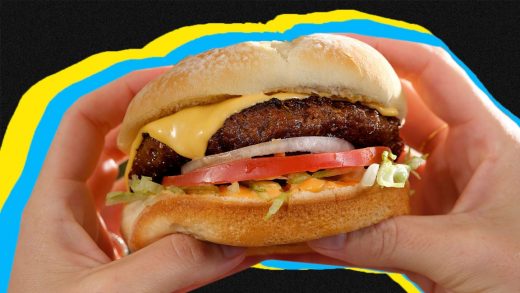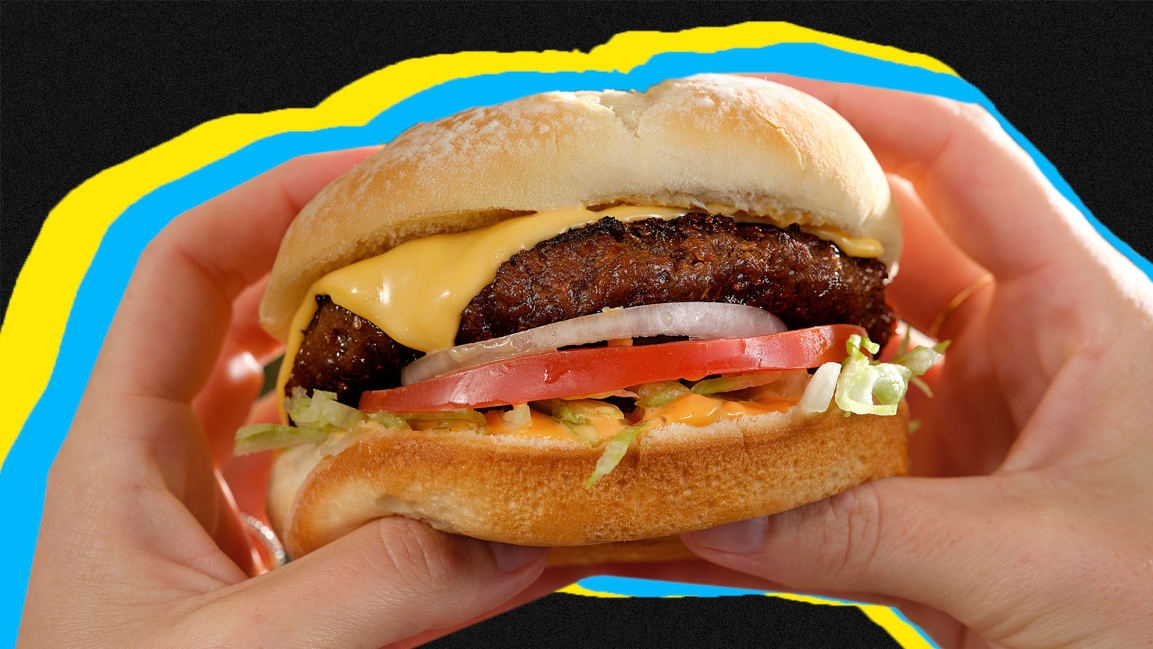McDonald’s and Beyond Meat say the McPlant burger will become a permanent menu item
Like most quick-service restaurant brands lately, McDonald’s has spent a lot of time reimagining the customer dining experience. It says you can expect to see innovations in how you order, where you pick up your food, and even if you interact with an employee at all.
Morgan Flatley, McDonald’s global chief marketing officer, paints a picture in which “the customer experience at the restaurant is going to dramatically change over the next few years,” and predicts this will include “very established products with Beyond” that build on top of the McPlant.
McDonald’s understands the role its brand equity can play in popularizing alt-meat. That’s why the McPlant spent months in a unique R&D setup where McDonald’s and Beyond’s teams worked side by side, Flatley says. Ethan Brown, Beyond Meat’s founder, president, and CEO, jokes that there’s actually a well-worn path between LAX and O’Hare thanks to all their traveling back and forth to each other’s kitchens, testing out patty formulations and toppings.
His view is the McPlant is a “combination of strengths.” Beyond brings the scientific know-how—applying the heat, cooling, and pressure that give plant materials the taste and sensory experience of animal protein—while McDonald’s delivers its iconic taste and an unmatched ability to scale the products it introduces.
“We know that our product is healthy—we feel really good about that,” Brown explains, but says their biggest question recently has been “How do we get to that taste that people are going to crave?”
If combined correctly, Beyond and McDonald’s believe their strengths can make the McPlant a gateway plant burger—the first truly available at scale, across multiple markets, and at an affordable price point so that billions of people can try it.
Brown sees this as bigger than a simple business opportunity. “It’s an opportunity to do something really important for the globe,” he says.
By working with McDonald’s vast, fine-tuned network of suppliers, Beyond has begun to visualize how its own plant burgers could go global. “That’s important from an economic development perspective and an innovation perspective,” Brown adds. “The ability to work with farmers all around the world to grow the crops that go into our products and to work with suppliers to bring those core parts of meat directly from plants is an exciting one for me.”
The gateway sandwich
Based on data so far, McDonald’s says the McPlant is most popular among flexitarians and other health-conscious eaters, and it’s an additive purchase. “What we’re seeing is that, over multiple weeks, this is one option in addition to other traditional McDonald’s products,” Flatley says. “They’re coming in for an incremental visit, is what we’re seeing in some of the European markets, and adding McPlant as that incremental visit on top of their traditional burger or chicken.”
Last month, analysts reported that McPlant sales were “underwhelming” at some test locations. Some stores were supposedly selling 20 per day, with ones down in that red-meat bastion of the Lone Star State moving as few as five. But Flatley says McDonald’s is undeterred. She points to the U.K., where the McPlant is “wildly successful”—after half a year on menus, it’s now rolled out market-wide, at all 1,400 outlets. The burger is also a permanent menu item in the Netherlands and Austria.
“We are confident this product will stay in restaurants,” Flatley says, unambiguously. “This is not a fad. It’s a product that is going to continue to grow.”
In the meantime, trends suggest diversifying beyond the traditional all-American burger is smart business strategy. Beef consumption is decreasing nationwide, yet chicken’s is higher than ever. Beyond Meat’s own plant-based chicken tenders have likewise grown into a top grocery seller, and KFC just started trialing Beyond fried chicken in January.
McDonald’s hinted that it and Beyond are aware of this, and already in the process of discussing new collaborations. Neither divulged what, exactly, though Flatley teases: “Without revealing anything, I’ll just say we continue to work with Ethan and his team on a full range of protein products . . . We definitely see those trends and want to make sure we’re continuing to build out a pipeline of products.”
“What we’re learning today is just the speed at which those products are going to come to market,” she explains. “That’s a bit of the unknown. But we will be ready when the consumer is ready.”
Correction: A previous version of this article described the McPlant burger as a “permanent” menu item; a McDonald’s spokesperson clarifies that it is a “core menu item” available in local markets depending on consumer demand. The timing of a test in Canada was also incorrect. We regret the error.
(42)



